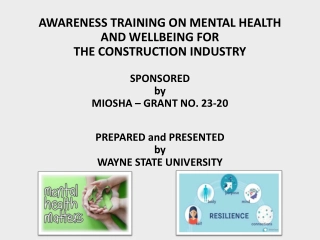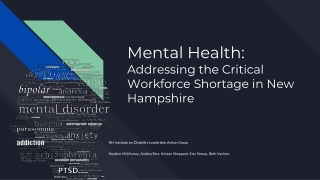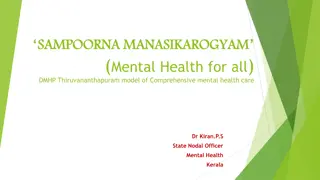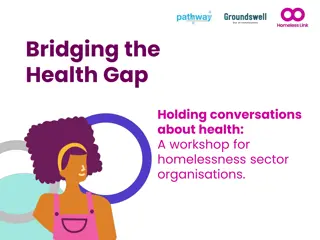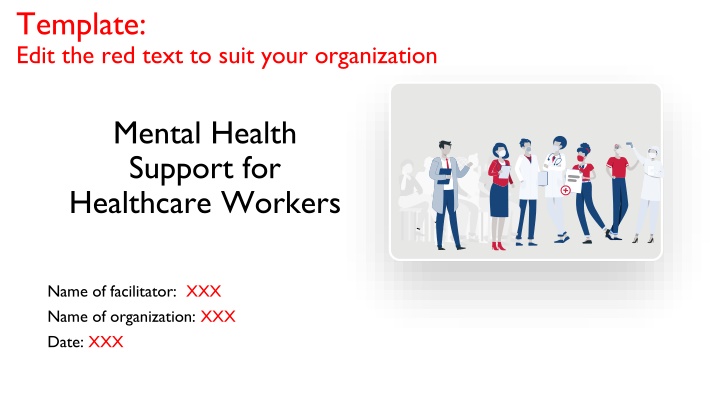
Mental Health for Healthcare Workers
Explore the importance of mental health, reduce stigma, and access support within healthcare organizations. Gain insights on the definition, key facts, and ways to promote mental well-being.
Download Presentation

Please find below an Image/Link to download the presentation.
The content on the website is provided AS IS for your information and personal use only. It may not be sold, licensed, or shared on other websites without obtaining consent from the author. If you encounter any issues during the download, it is possible that the publisher has removed the file from their server.
You are allowed to download the files provided on this website for personal or commercial use, subject to the condition that they are used lawfully. All files are the property of their respective owners.
The content on the website is provided AS IS for your information and personal use only. It may not be sold, licensed, or shared on other websites without obtaining consent from the author.
E N D
Presentation Transcript
Template: Edit the red text to suit your organization Mental Health Support for Healthcare Workers Name of facilitator: XXX Name of organization: XXX Date: XXX
Objectives Raise awareness about mental health Reduce stigma associated with accessing mental health Share information on the available mental health support offered within the organization
Some ground rules Before we start our discussion, let s set some ground rules. We are going to discuss sensitive topics. There might be differences in our opinions. There is no right and wrong. So let s hear each other, without taking it personally. The point of this discussion is not to necessarily agree, but to reflect together.
Lets brainstorm together What does mental health mean to you?
What is mental health? Mental health is a dynamic concept, it is an integral and essential component of general health. The World Health Organization (WHO) constitution states, Health is a state of complete physical, mental, and social well-being, and not merely the absence of disease or infirmity. * An important implication of this definition is that mental health is more than just the absence of mental disorders, or disabilities. Mental health is a state of well-being, in which an individual realizes his or her own abilities, can cope with the normal stresses of life, can work productively, and is able to make a contribution to his or her community. Mental health is fundamental to our collective and individual ability to think, emote, interact with each other, earn a living, and enjoy life. The promotion, protection, and restoration of mental health can be regarded as a vital concern of individuals, communities, and societies throughout the world. (Source: World Health Organisation. Mental Health: strengthening our response. March, 30 2018. https://www.who.int/en/news-room/fact-sheets/detail/mental-health-strengthening- our-response)
Key facts about mental health Mental health should be a focus for everyone - even more so if you work in environments with high emotional stress Taking care of your mental health positively impacts your general health and well- being The way we consider mental health is determined by a range of socioeconomic (e.g., culture, gender), biological (e.g., genetics, substance abuse), and environmental factors (e.g., housing conditions, noise pollution) We can improve our mental health through cost-effective and easily accessible ways
Lets discuss Has your view of mental health shifted after hearing these explanations? If so, what has shifted for you?
In the context of the COVID-19 pandemic COVID-19 has affected us all Developing resilience is crucial because it is the ability to adapt to this adverse event and develop new ways of coping. Resilience is the ability to adjust to the pandemic as an adverse event. It is about individuals having the capability to display behaviour that keeps themselves and others safe and healthy during the pandemic, and to perform key roles within families, communities and at work. Focusing on mental health increases our ability to cope with stressors, display healthy behavior, and perform our roles in our communities and families.
Stressors in the context of the COVID-19 pandemic What are stressors? Stressor is a general term for any factor that increases a person s mental or physical stress. Stressors can be described as related to the environment (e.g., inadequate housing) or personal (e.g., health related, sexual, social or related to work) (Source: Medical Dictionary. https://medical-dictionary.thefreedictionary.com/stressor)
Take a moment to consider this statement on the mental health of healthcare workers: Statement 1 of 2 Healthcare workers have been experiencing stressors, such as increased workloads, higher exposure to the COVID-19 virus, witnessing deaths and extreme suffering, stigmatization, and difficult moral decisions ( moral injury ). Healthcare workers worldwide have been more affected by mental health issues, with the following: irritation, anger, anxiety, helplessness, lack of motivation, tiredness, burnout, depression, trouble sleeping, and trouble concentrating. (Source: United Nations. Policy Brief COVID-19 and the Need for Action on Mental Health. May 13, 2020. https://unsdg.un.org/sites/default/files/2020-05/UN-Policy-Brief-COVID-19-and-mental-health.pdf) Then discuss: How is this similar to your experience?
Take a moment to consider this statement on the mental health of healthcare workers: Statement 2 of 2 Healthcare workers are also dealing with the impact of the pandemic on their own family members. Against this backdrop, they are expected to perform at work. Ongoing psychological distress can severely undermine healthcare workers decision making and well-being, and may lead to severe conditions in the future. If not dealt with properly, it can leave psychological damage. (Source: United Nations. Policy Brief COVID-19 and the Need for Action on Mental Health. May 13, 2020. https://unsdg.un.org/sites/default/files/2020-05/UN-Policy-Brief-COVID-19-and-mental-health.pdf) Then discuss: How does this affect work performance?
The support that is available to you Mental health is important to us and it is a team priority. It is our responsibility to care for ourselves, so that we can care for our clients. We have the mental health support below in place: (List the services your organization has in place. Below are examples.) Debriefing sessions occur monthly and are facilitated through your line manager. There is an Employee Assistance Program (EAP) through Discovery. For stressful events (such as the death of a family member or colleague), if you would like to talk to someone, we will refer you through the EAP program to talk to a counselor. The EAP program offers XXX. A quarterly well-being survey is conducted by the Human Resources Department to touch base with staff on their well-being. Annual team building to reflect on accomplishments and affirm the value of staff.
Lets discuss: Do these services address your needs as a healthcare worker? How can we make these services easier to access? What else can we do to support you to function at your best?
The contact for mental health support: Contact name: XXX Position of the point of contact: XXX Mobile number of the point of contact: XXX Office number of the point of contact: XXX Email address of the point of contact: XXX
Thank you Your organization logo here

